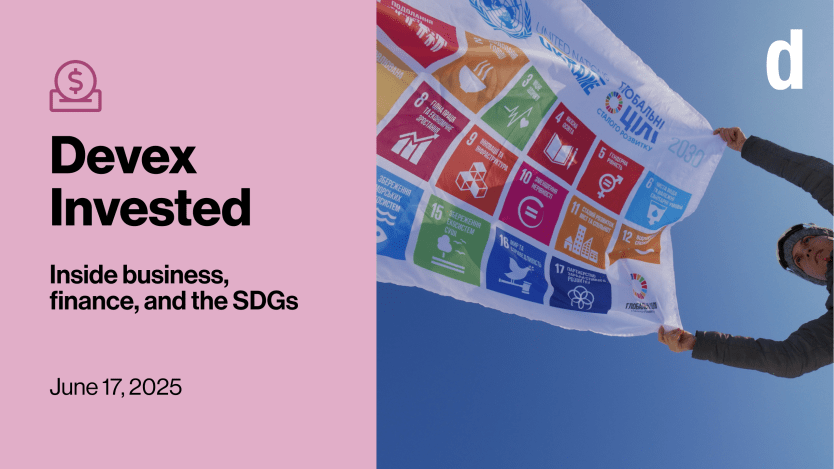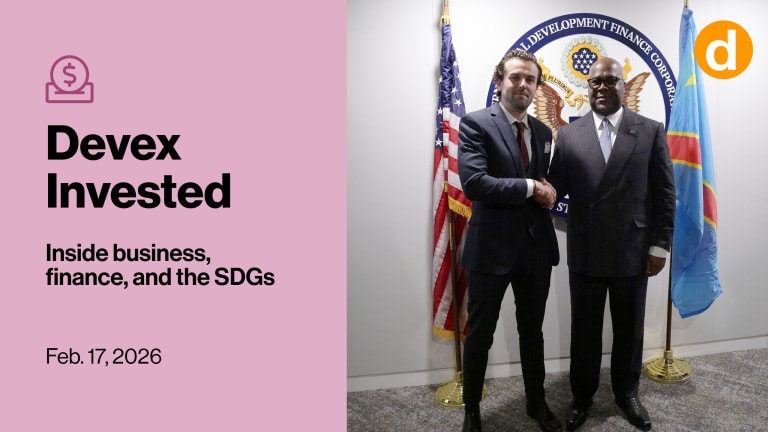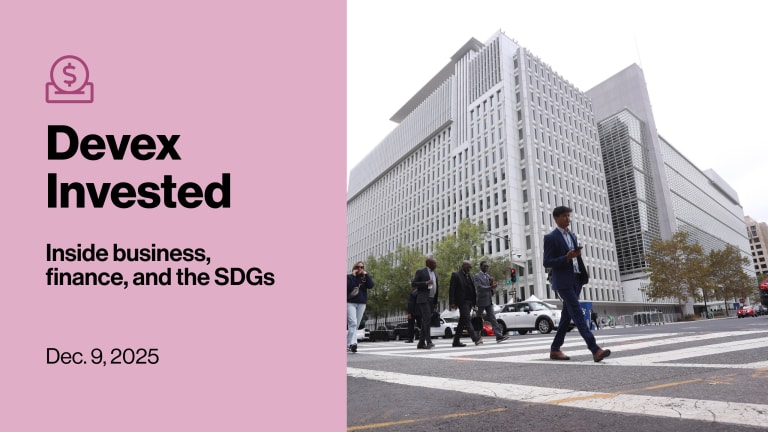
The year’s most anticipated development conference is just two weeks away, and trouble is on the horizon.
The Fourth International Conference on Financing for Development, or FfD4, in Seville, Spain, is meant to set the development world’s priorities for the next decade, but the Trump administration is waging an aggressive campaign to make sure its ambitions are as muted as possible. In closed-door United Nations talks, the U.S. has proposed over 400 amendments to a leaked draft of the FfD4 outcome document, my colleague Colum Lynch exclusively reports.
Key U.S. proposed amendments include:
• Striking out references to the Sustainable Development Goals and replacing them with “responsible development” goals.
• Blocking efforts to close the $4 trillion annual financing gap for the SDGs.
• Removing commitments on climate action and phasing out fossil fuel subsidies.
• Eliminating calls for debt relief and weakening provisions for sovereign debt restructuring.
• Rejecting any reference to gender equality, instead focusing on protections for “women and girls.”
• Opposing multilateral tax cooperation, including U.N.-backed proposals for a global tax treaty.
• Blocking stronger international trade regulations, including rules on tariffs and World Trade Organization reforms.
• Opposing commitments to “combat inequalities” between countries and prioritizing domestic resources over international financing.
“It’s a complete divide between the global north and the global south,” Ishaan Shah, a U.K.-based advocate with the Young Feminist Caucus, tells Colum. The Group of 77 — a coalition of over 130 low- and middle-income countries and China — is “adamant about not rolling back” pledges made at the previous FfD in Addis Ababa, Ethiopia, in 2015, he adds. The gist of their argument is “we agreed on this ten years ago.”
The ground is constantly shifting at preparatory FfD4 meetings. The U.S., U.K., EU, G77, Japan, Switzerland, and CANZ (Canada, Australia, and New Zealand), all “broke silence” over the weekend, which means that they formally objected to a draft agreement. They specifically objected to a paragraph in the text that would commit governments to try to create an international debt architecture under the U.N. that would give global south countries an equal seat at the table. Facilitators offered a new version that reinstated the debt section, but watered down the language on how hard the countries would work to address debt sustainability.
“The draft outcome document of the UN Financing for Development Conference, tabled for adoption … falls far short of the ambition the world urgently needs,” Iolanda Fresnillo, a policy and advocacy manager at the European Network on Debt and Development, tells me. “Key paragraphs have been significantly weakened during negotiations, with many meaningful commitments to reform the global economic system diluted at the insistence of Global North governments. Countries are not obligated to endorse this inadequate text today and can keep negotiations open until the conference in Sevilla. It is a clear case of ‘job not yet done.’”
Exclusive: US seeks to gut UN development goals
Background: What is Financing for Development 4 and why is it a big deal? (Pro)
Opinion: In Sevilla, we can deliver a game changer for development finance
+ Tomorrow, June 18, as part of our Road to Sevilla series, we will be doing a live interview with Leslie Maasdorp, CEO of British International Investment, to discuss how DFIs are adapting investment approaches as geopolitical landscapes shift, which frameworks are successfully combining financial sustainability with development, and public-private approaches. Register for the event here.
If you’re planning to be in Seville, be sure to register to visit us at Casa Devex, where we’ll be hosting exclusive interviews and panels with development leaders at a Spanish villa between June 29 and July 1. Sign up here.
Nod to nuclear
The World Bank is ending its decades-long ban on investing in nuclear energy, marking a potentially transformative moment for the global clean energy transition. In an internal note seen by Devex, the bank confirmed it will reenter the nuclear space for the first time since 1959, citing a commitment to support countries in choosing their own energy mix.
“Lifting the World Bank’s nuclear ban is a terrific change,” Todd Moss, the executive director of the Energy for Growth Hub, told Devex last week. “The agency can now get up to speed on technology and, ultimately, it will help countries deploy new clean energy to power economic growth.”
Meanwhile the World Bank remains split on fossil fuels. The internal document notes that board members have not reached agreement on whether to lift the bank’s ban on upstream gas projects, underscoring continued tensions.
“We don’t yet have agreement within our Board on whether the World Bank Group should engage in upstream gas — and if so, under what circumstances. This will require further discussion,” the note says.
Read: World Bank backs nuclear revival while gas stays a political fault line
Related: Top AfDB rules out nuclear in the mission to electrify Africa
Baby steps
The World Bank may have ended its nuclear ban, but you don’t just go nuclear overnight. It takes time. World Bank President Ajay Banga outlined the next steps the multilateral lender will be taking as it adds nuclear to its portfolio during a discussion at the Council on Foreign Relations last Thursday.
First is partnering with the International Atomic Energy Agency and its head, Rafael Grossi, “so that we can bring his knowledge … and regulatory policy and safeguards to what we think we can build up as well,” Banga said.
The second is extending fleet life in emerging economies that already have nuclear power, such as Brazil, Romania, and India. “Clearly, the economics of extending the life of these nuclear power projects is now far more preferential to building a new one,” Banga said.
“Then there's work we could do on getting new countries who want to get into [nuclear] to understand the regulatory policy, the safety, the disposal of waste management, the various things you will need, in addition to the nonproliferation aspects of it,” he added.
Lastly are small modular reactors, or SMRs, a type of nuclear fission reactor designed to be smaller and more adaptable than traditional nuclear power plants. “The problem is there's no standardization yet across the different variants,” Banga said of SMRs. “And therefore, if we can help to bring about standardization and scale in SMRs, could SMRs be the way of the future for a number of countries?”
Bonn before Belém
I’m in Bonn, Germany, this week for the midyear meeting on the road to the United Nations’ COP30 climate conference. While Bonn lacks the spotlight and spectacle of the upcoming gathering in Belém, Brazil, this month’s meeting marks the halfway point to COP30 and is critical in shaping the groundwork for November’s high-stakes climate talks.
Delegates here are negotiating the agenda, ironing out details on adaptation indicators, finance commitments, and the global stocktake — all essential pieces that will determine how ambitious and effective COP30 can be. The outcomes in Bonn will set the tone for whether COP30 delivers on urgent climate action or stumbles into a deadlock.
With more than 50 agenda items proposed and tensions rising over how streamlined the meeting should be, the Bonn session is already signaling potential battles ahead, especially on climate finance and loss and damage funding. Brazil, as COP30 president, is pushing for a focused, implementation-driven process, but many developing countries and civil society groups are pressing for stronger commitments and clearer accountability mechanisms.
As Bonn SB62 unfolds, it offers an early glimpse into which countries will lead, which will resist, and how the international community might navigate the complex path from pledges to action before the world’s eyes turn to the Amazon later this year. Plus, the conference is taking place in Germany’s postwar Parliament building!
Read: Before COP30 takes the spotlight, Bonn sets the stage
Hey, Invested readers! Are you in Bonn? Drop me a line at jesse.chaselubitz@devex.com.
DFC’s new management?
Benjamin Black, President Donald Trump’s nominee to lead the U.S. International Development Finance Corporation testified in front of the Senate Foreign Relations Committee last week to pitch a reimagined agency.
He sees DFC’s “dual mandate” — advancing economic development and strategic foreign policy — as integral to countering China’s global investments, my colleague Michael Igoe reports. He also wants to see more equity investments, in addition to the agency issuing loans. Black faced questions from Senate Democrats over potential conflicts of interest and the agency’s capacity following significant staff cuts.
“Until recently the U.S. Agency for International Development and the Millennium Challenge Corporation were laying the groundwork for private investment by building roads, installing electricity, delivering freshwater, and without these development projects it will be harder for the DFC to attract the private investments necessary to counter China’s Belt and Road Initiative,” said Sen. Jeanne Shaheen, a Democrat from New Hampshire.
The next step is for the Senate Foreign Relations Committee to vote on Black’s nomination. If they move him forward, his nomination will pass to the full Senate for debate and a vote.
Read: Trump's DFC nominee stresses 'dual mandate' of US development finance
What we’re reading
Chronos Capital doubles down on AI-driven health care innovations in emerging markets, aiming to revolutionize access and efficiency much like fintech did decades ago. [Bloomberg]
Despite proven effectiveness and strong demand, humanitarian cash aid faces shrinking budgets and political resistance — but advocates see a critical chance to scale cash assistance as the most efficient, dignified way to help people in crisis. [Devex]
The Asian Development Bank is reviewing its ban on funding nuclear power to meet Asia’s rising energy demand and climate goals. Following moves by the World Bank, Japan, Germany, and the U.S., ADB may support nuclear projects to help shift from coal and compete with Russia and China’s expanding nuclear influence. [Financial Times]
Anna Gawel contributed to this edition of Devex Invested.








